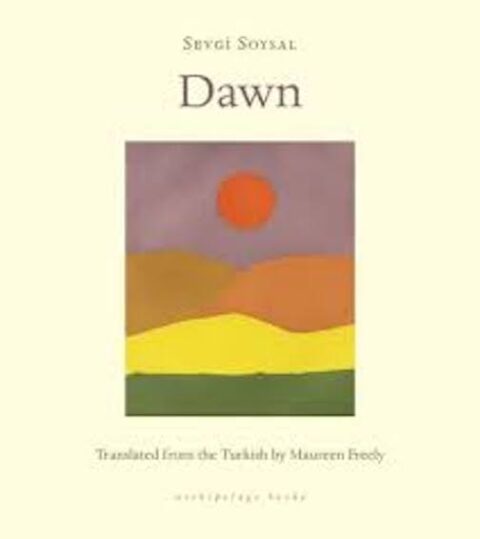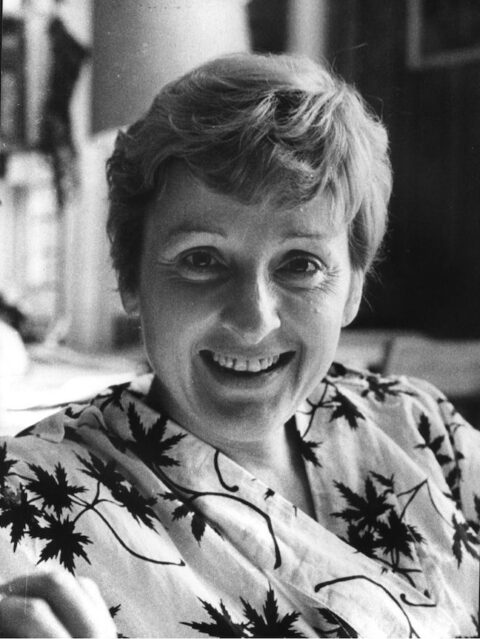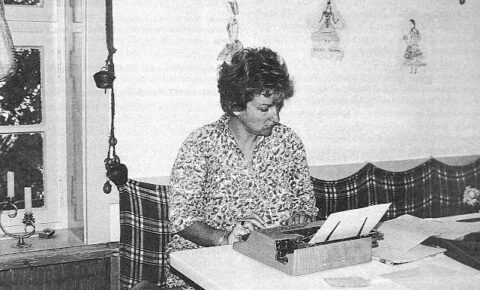When you hear that Sevgi Soysal’s Dawn, published in Turkish in 1975 and now translated into English by Maureen Freely, is based on Soysal’s experience in a Turkish prison, you might expect the novel to depict brutal torture in inhuman prison conditions. However, Soysal often defied expectations, both in her life and in her writing.
Having grown up in Ankara in a Turkish-German family, Sevgi Soysal married early but continued to work, write, and perform even after she had her first child. While acting at the National Theater, she fell in love with a fellow performer who became her second husband. Her second novel, Walking, depicted sex, marriage, and family from a woman’s point of view. Although Walking won a national prize, it was banned for obscenity. She then met and fell in love with the man who would become her third husband, Mumtaz Soysal. Not long after, in 1971, the Turkish military staged a coup and took control of the country. Mumtaz was jailed for spreading communist propaganda, but he and Sevgi married anyway. Then Sevgi was also sent to prison for spreading communist propaganda and for obscenity.
All of these life experiences gave Soysal an exquisitely nuanced understanding of the vagaries of the human psyche. Empowered by her understated ironic voice, Dawn reveals the dangerous absurdity of unchecked power and the infinite strategies people have for surviving or justifying their survival in such conditions.
 Dawn is divided into three chapters and the first, “The Raid,” opens with the police kicking down the door of the home of Ali, a laborer at a textile factory in Adana, during a celebratory dinner. Ali is hosting this gathering for his nephew Mustafa, a leftwing activist who has just been released from prison. This dinner should have been a happy occasion, but no one is content. Each character is full of insecurity, petty jealousy, or self-doubt, and the gathering seethes with the attendees’ contradictory desires, recriminations, and self-recriminations, a microcosm of society.
Dawn is divided into three chapters and the first, “The Raid,” opens with the police kicking down the door of the home of Ali, a laborer at a textile factory in Adana, during a celebratory dinner. Ali is hosting this gathering for his nephew Mustafa, a leftwing activist who has just been released from prison. This dinner should have been a happy occasion, but no one is content. Each character is full of insecurity, petty jealousy, or self-doubt, and the gathering seethes with the attendees’ contradictory desires, recriminations, and self-recriminations, a microcosm of society.
Mustafa is riddled with righteous anger against oppression but also consumed with guilt for breaking under interrogation while in Istanbul’s Selimiye prison. “It was Ali he had ratted on. Ali and the whole Maras tribe. He’d betrayed them first, and he’d gone on to betray all the rest. The masses.” He considers himself a coward but also despises Hüseyin, his older brother, for pretending to be a socialist while caring only for money. Oya Ertem, a slight acquaintance of Hüseyin’s, is in exile in Adana after being released from prison in Ankara for some unspecified act of agitation. She “took courageous stands for no other reason than she found beauty in courage itself. Ask her to confront an ugly fact or deed, though, and she collapsed.” She accepts Hüseyin’s invitation to the celebratory dinner, not because they are great friends but because she is lonely in her exile and “she was still a card-carrying member of the bourgeoisie, content to let life unfurl as it may.” Ali, the host of the dinner, is the steadiest member of the group. He takes his responsibilities as the head of the clan very seriously, shouldering the financial responsibility of educating Hüseyin and Mustafa, since their father is not able to. He is apolitical, preferring to help men from his hometown get set up in business.
Soysal’s characters, so human and fallible, remind us of ourselves and make us wonder how we would react in a similar situation. In a society where the heavy hand of an authoritarian government may strike at any moment, Soysal implies, people are much more complicated than unquestioning loyalists to a cause. She also makes it easy for us to sympathize with Mustafa’s hollowness resulting from being tortured in prison. Mustafa thinks to himself about his “aching soul. That was the hardest thing to bear. Worse than being stripped naked. Worse than the electric shocks. Worse than walking on ruptured soles …The gnawing fear that he had nothing left to hide or confess. That there was nothing left to him.” Soysal skillfully conveys the devastation of torture without depicting the lurid scene.
“The Interrogation,” the second chapter, is both bracing and breathtaking. Soysal does not shy away from the many ways that women are violated in prison, even by their own bodies. Oya, for example, anguishes over a very real concern for any woman: the shame of getting your period and, thus, “soiling” yourself while in detention. “And if my period comes tonight? More than anything, it’s this that Oya most fears. If we see our own bodies as shameful. … how are we ever to stand up for our beliefs? If my period starts tonight, then what?”
Although it may seem as if Soysal is dismissive of Oya, the events Oya witnesses and the people she meets give the novel its moral heft. Soysal slowly builds on the violence against women throughout this chapter. At one point, Oya is left alone in a room to ponder a truncheon — a weapon that men have turned “into the ugliest, vilest travesty of their own penises” —that has been left on the table.
 Of course, such a violent phallic symbol cannot be introduced into a story without being used. But this is where Soysal defies our expectations most spectacularly: the horror of the truncheon is on full display without ever being on full display. When Oya sees the truncheon on the table, she remembers the prison in Ankara where she was held before being sent into exile and all the women she met there. One of them, Sema, explains to Oya the psychological damage that is worse than the physical hurt caused by torture: “Three men. Well maybe I shouldn’t even call them men. Three of them, goading each other on. Ramming that truncheon into my anus. The pain was insane, but even stronger was my disgust, my shame.” And, yet, “[l]ater on, in court, she spoke with great calm about the many months of bleeding that had followed.”
Of course, such a violent phallic symbol cannot be introduced into a story without being used. But this is where Soysal defies our expectations most spectacularly: the horror of the truncheon is on full display without ever being on full display. When Oya sees the truncheon on the table, she remembers the prison in Ankara where she was held before being sent into exile and all the women she met there. One of them, Sema, explains to Oya the psychological damage that is worse than the physical hurt caused by torture: “Three men. Well maybe I shouldn’t even call them men. Three of them, goading each other on. Ramming that truncheon into my anus. The pain was insane, but even stronger was my disgust, my shame.” And, yet, “[l]ater on, in court, she spoke with great calm about the many months of bleeding that had followed.”
Menekşe, another woman that Oya met in the Ankara prison, has also been brutally tortured but remains unabashedly sexual. She dances freely and sings to the gendarmes patrolling the prison grounds, “You tasted good, little boy! As good as your truncheon, or almost!” Soysal doesn’t ignore the phallic instrument of torture, but she gives more attention on the women’s resilience.
It is in this context that Mustafa’s and Oya’s small acts of defiance take on their true significance. When commanded to write a confession for her crimes, which the authorities “have evidence of anyway,” Oya refuses to confess to anything. Instead, she takes the paper she was given and stuffs it in her underwear to soak up any blood in case she really does get her period while in prison. Mustafa’s refusal to confess to anything, in light of his previous inability to stop himself from ratting out everyone he knew, is admirable.
The charges being levelled at Ali and his guests are never specified. The arbitrariness of their detention is matched only by the arbitrariness of their release in the final chapter, “Dawn.” They have survived their twelve-hour ordeal and are released in the early morning hours because a phone call comes from the Martial Law Command to Zekai Bey, Chief Constable of the Adana police, to let them go.
Although a dawning day is often symbolic of rebirth and second chances, Soysal turns that image on its head. Ali, realistic, responsible, hardworking, wants to go back to work upon his release, in spite of his pain, his bloody feet, and his swollen eye. At the factory, the manager of the factory assumes Ali is guilty or else the police wouldn’t have beat him up. The manager says he is going to dock three days’ pay from Ali, “one because he won’t be working today. The other two to teach him a lesson.” However, rather than accepting the absurd injustice of the situation, Ali seethes with anger: “He’s not going to let them dock his pay. He won’t be wronged like this. So what if it’s only three days. He’s going to insist on his rights.” The entire experience, instead of subduing Ali, has turned him into a newfound radical.
Mustafa, on the other hand, gets on a bus to reunite with his wife. He acknowledges his limitations and his failures, as a husband and as an activist. He must “mend his shattered life. Adana has shamed Mustafa, crushed him. Adana is his debt to Ali.”
 Oya has, perhaps, the greatest gulf to cross upon her release, perhaps because it is the most abstract. She must “stop playing the observer” and give her life a purpose. While she is ruminating on her future, she is accosted by a strange man. Being a woman and alone, she knows she is prey. While waiting on a bridge for her bus, she meets a young boy named Cevdet, who reminds her of other Cevdets she knows. That’s when she realizes that “she still isn’t free. Nor can she ever be. She must stay inside. With the Cevdet who is locked up in Ankara Central Prison with his mother, Firdevs. And with the Cevdet who is waiting for the bus to Siverek. Unless they can all live together in freedom, she will remain with them, behind bars. If she doesn’t, she’ll have only tricked herself into believing … that she’s truly free. Until she’s locked up again by another Cevdet. By every Cevdet under the sun.”
Oya has, perhaps, the greatest gulf to cross upon her release, perhaps because it is the most abstract. She must “stop playing the observer” and give her life a purpose. While she is ruminating on her future, she is accosted by a strange man. Being a woman and alone, she knows she is prey. While waiting on a bridge for her bus, she meets a young boy named Cevdet, who reminds her of other Cevdets she knows. That’s when she realizes that “she still isn’t free. Nor can she ever be. She must stay inside. With the Cevdet who is locked up in Ankara Central Prison with his mother, Firdevs. And with the Cevdet who is waiting for the bus to Siverek. Unless they can all live together in freedom, she will remain with them, behind bars. If she doesn’t, she’ll have only tricked herself into believing … that she’s truly free. Until she’s locked up again by another Cevdet. By every Cevdet under the sun.”
Sevgi Soysal has written a powerful, nuanced novel of resistance. Maureen Freely, widely regarded as a foremost translator of Turkish literature, has given us a rendition so seamless and confident that I felt I was hearing Soysal’s own voice. Each modulation in a character’s thoughts or emotions is described with sensitivity and fluidity. Soysal includes many wonderful descriptions of food and ambiance, and Freely conveys the flavor of the foods and the feel of the various spaces perfectly. Soysal wrote constantly while she was in prison, and those pieces were the first longform works that Freely ever translated. Unfortunately, Soysal died of cancer in 1976, one year after Dawn was published to acclaim in Turkey. But this translation has me musing about the wonderful literary works we could have had if Soysal and Freely had been allowed to collaborate more over the years.
[Published by Archipelago Books on November 15, 2022, 350 pages, $20.00 US paperback]